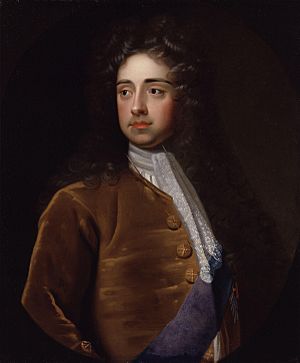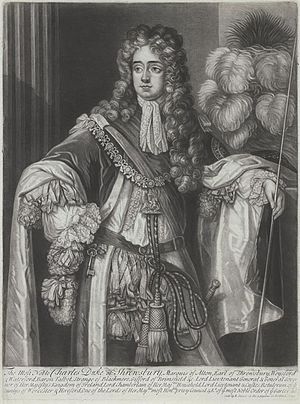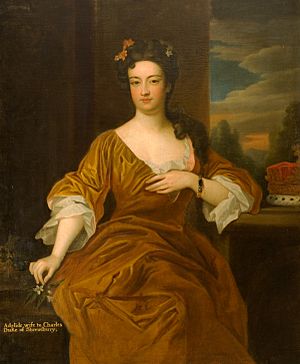Charles Talbot, 1st Duke of Shrewsbury facts for kids
Quick facts for kids
The Duke of Shrewsbury
|
|
|---|---|

The Duke of Shrewsbury by Sir Godfrey Kneller
|
|
| Chief Minister of Great Britain Lord High Treasurer |
|
| In office 30 July 1714 – 13 October 1714 |
|
| Monarch | Anne George I |
| Preceded by | The Earl of Oxford and Earl Mortimer |
| Succeeded by | The Earl of Halifax as First Lord of the Treasury in Commission |
| Lord Chamberlain | |
| In office 1710–1715 |
|
| Monarch | Anne George I |
| Preceded by | The Marquess of Kent |
| Succeeded by | The Duke of Bolton |
| In office 1699–1700 |
|
| Monarch | Anne |
| Preceded by | The Earl of Sunderland de jure Vacant de facto |
| Succeeded by | The Earl of Jersey |
| Lord Lieutenant of Ireland | |
| In office 22 September 1713 – 21 September 1714 |
|
| Monarch | Anne George I |
| Preceded by | The Duke of Ormonde |
| Succeeded by | The Earl of Sunderland |
| Secretary of State for the Southern Department | |
| In office 27 April 1695 – 12 December 1698 |
|
| Monarch | William III and Mary II |
| Preceded by | John Trenchard |
| Succeeded by | James Vernon |
| In office 14 February 1689 – 2 June 1690 |
|
| Monarch | William III and Mary II |
| Preceded by | The Earl of Middleton |
| Succeeded by | The Earl of Nottingham |
| Secretary of State for the Northern Department | |
| In office 2 March 1694 – 3 May 1695 |
|
| Monarch | William III and Mary II |
| Preceded by | John Trenchard |
| Succeeded by | William Trumbull |
| Personal details | |
| Born |
Charles Talbot
15 July 1660 |
| Died | 1 February 1718 (aged 57) Warwick House, Charing Cross, London, England, Kingdom of Great Britain |
| Spouse | Adelhida Paleotti |
| Parents | 11th Earl of Shrewsbury Anna Maria Brudenell |
Charles Talbot, 1st Duke of Shrewsbury (born July 15, 1660 – died February 1, 1718) was an important English politician. He was a member of the Whig party. He played a key role in the Glorious Revolution, which changed who ruled England.
He was born into a Roman Catholic family. However, he decided to join the Church of England in 1679. This was a time when there was much concern about Catholics in England. Shrewsbury became a member of the House of Lords in 1680. He also held some smaller jobs in the royal court.
When King James II came to power in 1685, Shrewsbury served in the army. But he later left the army because he didn't want to become Catholic again. He then started to work with William of Orange. Shrewsbury's home became a meeting place for those who opposed King James II. He was one of seven English leaders who invited William to invade England in 1688.
Shrewsbury went to Holland and returned with William in November 1688. He helped a lot in deciding how the new government would work. He strongly supported William and Mary becoming the new King and Queen. He left William's government in 1690 due to health issues. He also disagreed with some of the King's decisions.
Later, Shrewsbury secretly contacted the old royal family (the Stuarts) who were living in France. This was just in case they might return to power. In 1694, he came back to government. He helped convince Parliament to give money for William's war against France. He resigned again in 1698 and 1700 because of his health.
From 1700 to 1705, Shrewsbury lived outside England. During this time, he married Countess Adelhida Paleotti. He returned to government in 1710. He supported making peace with France to end a big war called the War of the Spanish Succession. He was worried about how much the war was costing. In 1712, he became an ambassador to France. Then he became the Lord Lieutenant of Ireland. He came back to England in June 1714.
In July 1714, Shrewsbury was made Lord High Treasurer. This was a very important job. But in August, Queen Anne died. George I became the new King. The new government did not want Shrewsbury to stay in his job. By 1715, he had lost all his government roles. He died in 1718.
Contents
Early Life and Family
Charles Talbot was the only son of the 11th Earl of Shrewsbury. His mother was Anna Maria Brudenell. King Charles II was his godfather, and Charles was named after him.
He grew up as a Roman Catholic. However, after his father's death in 1668, he was raised by Protestant relatives. In 1679, he decided to become a member of the Church of England. This decision was influenced by a religious leader named John Tillotson.
Serving Kings Charles II and James II
When his father died, Charles became the Earl of Shrewsbury. He got a job in King Charles II's household. He also served in the army under King James II.
However, by 1687, he was secretly talking with William of Orange. He was one of seven people who signed a letter inviting William to invade England. Shrewsbury also helped pay for the planned invasion. He went to Holland to join William. Then, he returned with William to England in November 1688 during the Glorious Revolution.
The Glorious Revolution and William III
Shrewsbury became Secretary of State for the Southern Department in the first government of William and Mary. He took over from his uncle, the Earl of Middleton. But he left this job in 1690 when the Tories gained more power in Parliament.
While not in government, he suggested a law called the Triennial Bill. This bill would have required Parliament to meet more often. The King did not agree to it at first. In 1694, Shrewsbury became Secretary of State again. There is some evidence that he had also been in contact with the Jacobites. These were people who supported the old King James II, who was living in exile in France.
However, King William seemed to trust Shrewsbury. On April 30, 1694, Shrewsbury was given the titles Marquess of Alton and Duke of Shrewsbury. He also acted as one of the regents. This meant he ruled for the King when William was away from England. In 1696, he faced accusations of disloyalty. But William told Shrewsbury about them right away. Around this time, Shrewsbury took less part in public work. He often said he wanted to resign due to his health. His health problems were real. In 1700, the King finally let him retire from public life.
Time Abroad
For the next seven years, Shrewsbury lived outside England. He spent most of his time in Rome. In 1701, he wrote a famous letter saying how much he disliked public life. He also visited France and Switzerland.
Return to England and Queen Anne

When Queen Anne became queen, some political leaders tried to get Shrewsbury to return to government. He finally came back to England on December 30, 1705. After returning, Shrewsbury focused on building Heythrop Park.
He took his seat in the House of Lords in January 1706. Over time, he grew apart from his old political friends. In 1710, he accepted the job of Lord Chamberlain in the Tory government. The Queen appointed him without telling some of her other ministers. His wife also became a Lady of the Bedchamber.
Lord Chamberlain and Lord Treasurer
After a diplomatic trip to France to discuss peace, Shrewsbury became Lord Lieutenant of Ireland in 1713. But he was in London in July 1714. This was a very important time because Queen Anne was dying. On July 29, the Earl of Oxford was removed from his job as Lord Treasurer. On July 30, Shrewsbury and other ministers met at Kensington Palace. They went to the Queen's room. Another minister suggested that Shrewsbury be appointed Lord Treasurer. Queen Anne immediately gave him the staff for this important job. He was the last person to hold this position. He was also the first person to be Lord Lieutenant of Ireland, Lord Chamberlain, and Lord Treasurer all at the same time.
King George I Takes the Throne
When the Queen died on August 1, Shrewsbury was in a very powerful position. He helped a lot in making sure that George I became the new King peacefully. He also helped stop the Jacobites from trying to put the son of James II on the throne.
However, Shrewsbury still did not want the highest political jobs. He resigned from being Lord Treasurer and Lord Lieutenant of Ireland. He was then appointed Lord Chamberlain. He resigned from this job in July 1715.
His Impact
The Duke of Shrewsbury was one of the most important noblemen during Queen Anne's reign. Even though he was blind in one eye, he was very handsome. He was also dignified and polite. Swift called him "the finest gentleman we have." King William III called him "the King of Hearts."
Like many politicians of his time, he tried to stay on good terms with both the exiled Stuart family and the current King in England. But at two very important times, in 1688 and 1714, he strongly supported the Protestant line of succession. At other times, he seemed unsure. He never fully supported either the Whigs or the Tories, though he worked with both. He was not mean-spirited like some politicians. His poor health and lack of ambition probably kept him from taking more power.
Private Life and Death
In 1705, Shrewsbury married Adelhida Paleotti in Augsburg, Bavaria. She was the daughter of Marquis Andrea Paleotti.
After Shrewsbury returned to England, the Duchess became well-known in London society. She was liked by Queen Anne. During their time in Paris, she was very popular because she was welcoming and good at conversation.
When George I became King, the Duchess of Shrewsbury became a lady of the bedchamber to the Princess of Wales. She kept this job until she died on June 29, 1726.
Shrewsbury had no children. So, when he died, his title of Duke ended. The title of Earl of Shrewsbury passed to his cousin, Gilbert Talbot. Gilbert was a Roman Catholic priest living abroad. When Gilbert died in 1744, the titles and lands went to his brother George.
Charles Talbot died at his London home, Warwick House, on February 1, 1718. He was fifty-seven years old. He was buried in his family's tomb in the church of Albrighton, Shropshire.
See also
- William Chaloner
- List of deserters from James II to William of Orange
 | Precious Adams |
 | Lauren Anderson |
 | Janet Collins |


